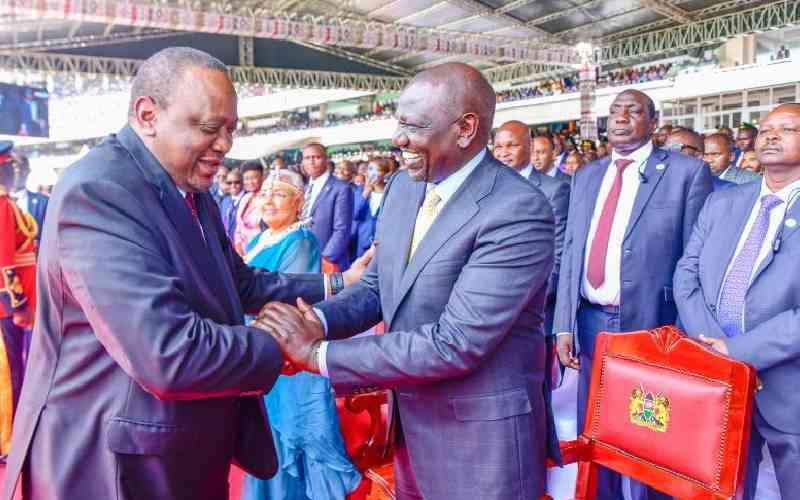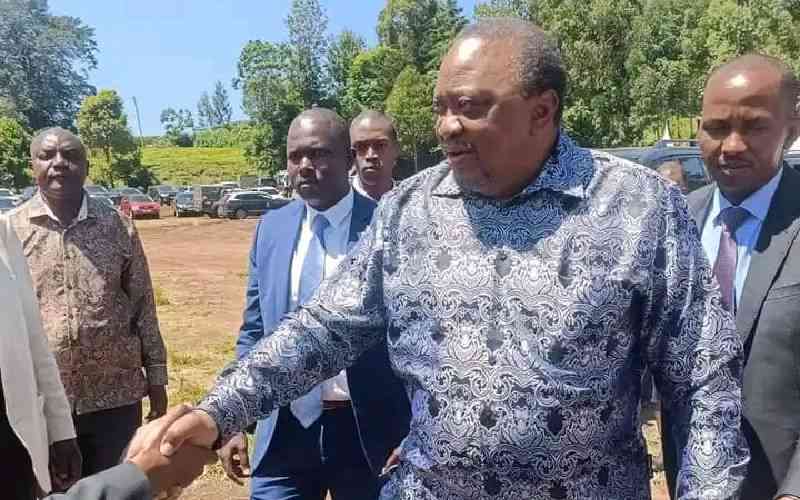Priscilla Nyokabi Kanyua, the 36-year-old Nyeri County Woman Representative, cuts the figure of a polished but humble politician.
Always on A-length African (Kitenge) dresses, Nyokabi rarely delves into controversy. When she speaks or makes a social media update, one can safely bet that it would be on an issue rather than personality. She is fond of giving social media updates on her parliamentary engagements, titling them “Bunge update”.
She occasionally lets down her hair though, sharing on the light side of life. In August 2013, for example, the former Kituo cha Sheria Executive Director (2009-2013) appealed in a Facebook post: “I have very few followers on Twitter... Please help...” A few months later, she wrote how her mobile phone was dwarfed by her colleague’s gadgets during an East African parliamentarians’ retreat in Uganda.
But in the past few weeks, Nyokabi’s name has featured prominently in and outside Nyeri, with claims that she was part of the group that “fixed” President Uhuru Kenyatta in the International Criminal Court (ICC).
The MP has been accused of contributing to the ICC process, which eventually led to Uhuru’s indictment during her time at the helm of Kituo cha Sheria. Nyokabi has vehemently denied this, terming it as a vendetta and saying Kituo cha Sheria only participated in victim identification during Operation Rudi Nyumbani spearheaded by the Government.
Nyokabi, a first-time TNA MP, links the tirade of attacks against her on social meadia to her political detractors who want to create a wedge between her and her Jubilee coalition leaders. “I remain loyal to the President and his Deputy. I am a diligent Jubilee MP and I believe in its leadership,” she told The Standard on Sunday from Italy, where she was on official duty.
In recent weeks, Nyokabi has come under attacks pioneered by David Matsanga, a Ugandan known for his criticism of ICC and neo-colonialism, on social media.
Matsanga has stealthily taken his fight against the ICC to the Nyeri County MP and claims she played a role in the crimes against humanity cases against President Uhuru Kenyatta, Deputy President William Ruto and journalist Joshua arap Sang.
The Ugandan justifies his attacks on Nyokabi as pursuit for the truth, “not witch-hunt or blackmail. I am just being fair to ICC suspects.”
Leadership crisis
A tormented Nyokabi says the attacks, which prompted a low key demonstration last Friday in Nyeri, is a vendetta against her based on falsehoods. (See separate interview). She claims the social media war is part of the unresolved leadership crisis in the TNA Nyeri branch.
But a source in TNA gave The Standard on Sunday a different opinion on the controversy. He claimed the tirade has something to do with the county MP’s growing influence “driven by personal chemistry with the President”.
Asked why the President would not come to Nyokabi’s defence, the source claimed that the Head of State does not interfere in fights pitting his loyal supporters, especially those to do with tussles for party positions. TNA officials Johnson Sakaja (chairman) and Onyango Oloo (Secretary General), did not get back to us regarding the party’s position on the issue.
Nyokabi’s alleged role in the ICC cases has attracted cheers and jeers from a cross-section of Kenyans, the most vocal being Cathy Wanjiku Irungu — a pioneer TNA enthusiast in Nyeri — who feels that the county MP unfairly snatched the party ticket, and ultimately the parliamentary seat, from her.
Angry responses
Stay informed. Subscribe to our newsletter
Wanjiku claims Nyokabi appeared on the political scene at the last minute when others like her had pumped resources to recruit members and lay grassroots party structures. She claims that when the former Kituo cha Sheria boss appeared on the scene in October 2012, nobody thought she would go for the TNA ticket.
Wanjiku claims that hopefuls for the county MP seat were prevailed upon by “kingmakers” in Nyeri to give up the ticket for Nyokabi.
But Matsanga dismissed these claims. “My pursuit for the truth on how Kenya (ICC) suspects were fixed has nothing to do with the politics of Nyeri or the position the fixers hold in which party or in which Government they worked,” Matsanga said in a Facebook post.
Elaborate attack
Lawyer Paul Mwangi, who was former Prime Minister Raila Odinga’s adviser on Constitutional Affairs in the Grand Coalition Government, also weighed in on the debate. Mr Mwangi wrote on social media that the allegations against the first-time MP appear well coordinated.
“My thinking tells is that there is more than meets the eye,” said Mwangi. “Who has the power and influence to coordinate such an elaborate attack on a first-time MP, who, for all the one and a half years she has been in Parliament, has not been politically spectacular?”
Mwangi said he finds it intriguing that Nyokabi had attracted the attention of persons at the highest level of the political hierarchy. “Whatever the plot, it clearly has two elements — passion and power,” he said.
An application to the ICC made on September 5, 2012 by Kituo cha Sheria seeking to present views on modalities of victim participation is at the heart of Nyokabi’s woes.
As Executive Director of Kituo cha Sheria, Nyokabi argued for and signed the application which was later rejected by the judges that Kituo wanted to be given an amicus curiae role to guide the court in crafting a friendlier victim participation protocol for the trial phase which was about to begin.At the time, lawyers who had been representing victims in the pre-trial stages — Sureta Chana and Morris Anyah — were “provisionally” serving their roles pending a review of victims representation following a number of issues raised by the ICC registry.
“At the time of this application, Kituo is conducting awareness sessions on victims’ participation in ICC proceedings and related matters in some of the above mentioned areas. In the process of this, we have encountered issues that we believe are significant at this stage of the proceedings and could be of assistance to the Chamber,” Nyokabi’s application read.
She told the judges that Kituo cha Sheria was “in constant communication” with victims who appear to be within the scope of the two cases, and that in the months of June and July 2012, the organisation had conducted “outreach sessions” to 434 victims in Molo, Nakuru, Naivasha, Eldoret, Kitale and Kericho.
Nyokabi said Kituo wanted to intervene on three issues; the importance of meaningful participation for victims in Kenya, the application process relating to the participation of victims in the trial and considerations relevant to modalities of victim participation and their representation at trial.
 The Standard Group Plc is a
multi-media organization with investments in media platforms spanning newspaper
print operations, television, radio broadcasting, digital and online services. The
Standard Group is recognized as a leading multi-media house in Kenya with a key
influence in matters of national and international interest.
The Standard Group Plc is a
multi-media organization with investments in media platforms spanning newspaper
print operations, television, radio broadcasting, digital and online services. The
Standard Group is recognized as a leading multi-media house in Kenya with a key
influence in matters of national and international interest.
 The Standard Group Plc is a
multi-media organization with investments in media platforms spanning newspaper
print operations, television, radio broadcasting, digital and online services. The
Standard Group is recognized as a leading multi-media house in Kenya with a key
influence in matters of national and international interest.
The Standard Group Plc is a
multi-media organization with investments in media platforms spanning newspaper
print operations, television, radio broadcasting, digital and online services. The
Standard Group is recognized as a leading multi-media house in Kenya with a key
influence in matters of national and international interest.








